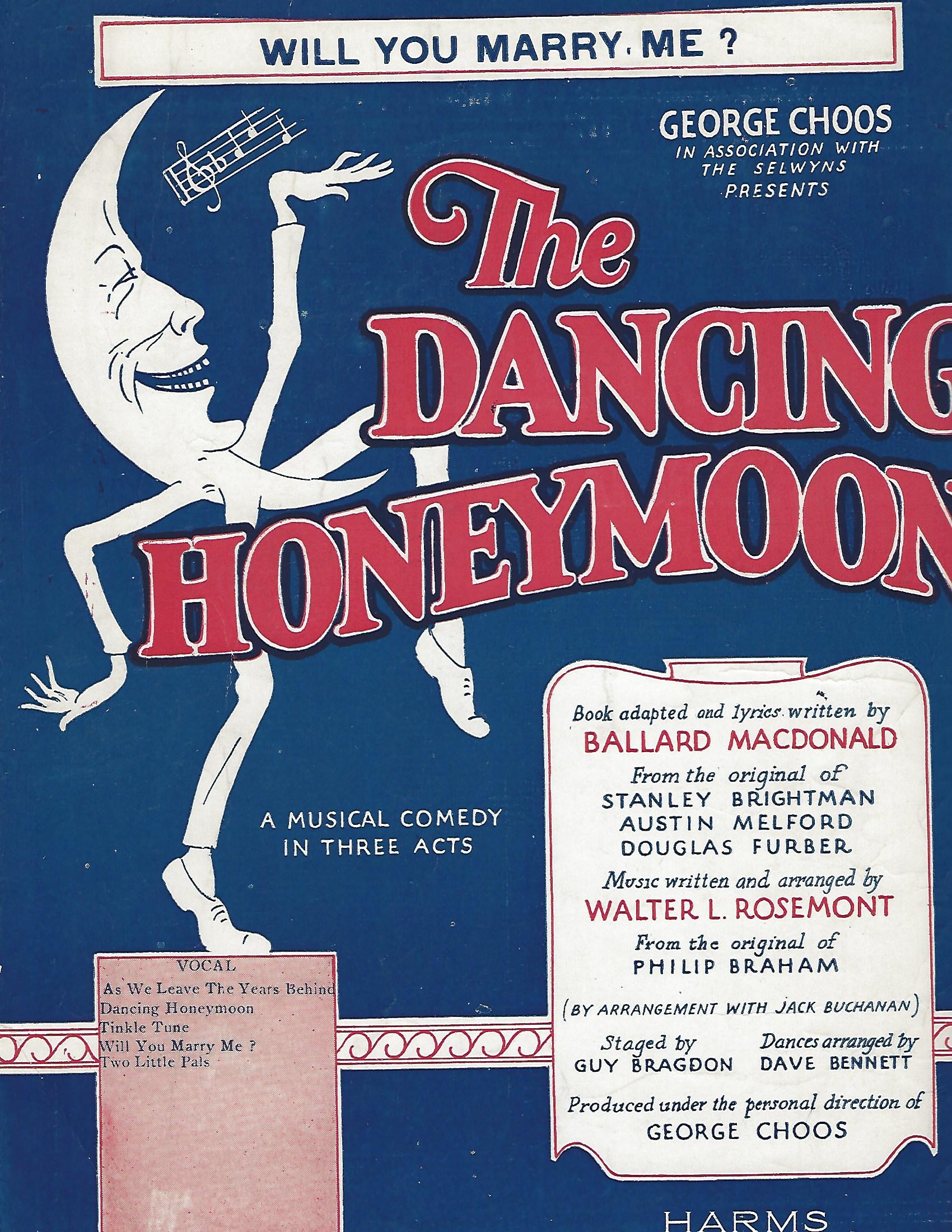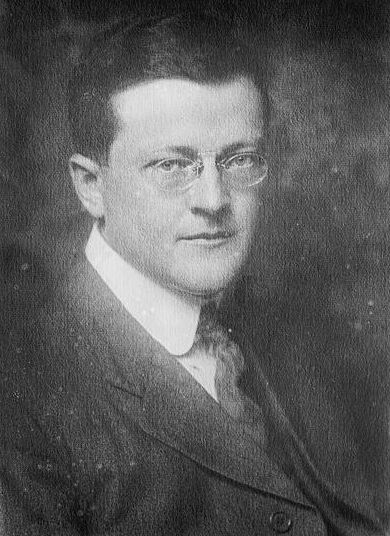|
Battling Buttler
''Battling Buttler'' is a musical in three acts with music by Philip Braham and a book and lyrics by Stanley Brightman, Austin Melford and Douglas Furber, which opened in London in 1922. It was then greatly revised by Walter L. Rosemont (music) and Ballard MacDonald (book and lyrics) and produced on Broadway in 1923 after tryouts in Detroit and Chicago. The farcical story concerns a man who pretends to be a championship boxer whom he resembles, until the two men are confused with one another, with humorous results. Productions ''Battling Buttler'' premiered in London on December 8, 1922, at the New Oxford Theatre, where it ran for 238 performances, starring Jack Buchanan, who also produced and choreographed the musical.Dietzpp. 172–173/ref> After a major rewrite and Americanization by Walter L. Rosemont (music) and Ballard MacDonald (book and lyrics), the musical was produced under the name ''The Dancing Honeymoon'', opening on August 19, 1923, to rave reviews in Detroit, ... [...More Info...] [...Related Items...] OR: [Wikipedia] [Google] [Baidu] |
Broadway Theatre
Broadway theatre,Although ''theater'' is generally the spelling for this common noun in the United States (see American and British English spelling differences), 130 of the 144 extant and extinct Broadway venues use (used) the spelling ''Theatre'' as the proper noun in their names (12 others used neither), with many performers and trade groups for live dramatic presentations also using the spelling ''theatre''. or Broadway, are the theatrical performances presented in the 41 professional theatres, each with 500 or more seats, located in the Theater District and the Lincoln Center along Broadway, in Midtown Manhattan, New York City. Broadway and London's West End together represent the highest commercial level of live theater in the English-speaking world. While the thoroughfare is eponymous with the district and its collection of 41 theaters, and it is also closely identified with Times Square, only three of the theaters are located on Broadway itself (namely the Broadwa ... [...More Info...] [...Related Items...] OR: [Wikipedia] [Google] [Baidu] |
Joseph Meyer (songwriter)
Joseph Meyer (March 12, 1894 – June 22, 1987) was an American songwriter, who wrote some of the most notable songs of the first half of the twentieth century. Many of his songs were originally written for Broadway musicals. Meyer collaborated with many famous songwriters of the day including Buddy DeSylva, Al Lewis and Al Sherman. Three of his most famous songs were the 1922 hit, "California, Here I Come", "My Honey's Lovin' Arms" (1922) and " If You Knew Susie" (1925), a song he co-wrote with Buddy DeSylva. Meyer songs have been featured in over 120 motion picture soundtracks. He wrote the melody to " A Cup of Coffee, a Sandwich, and You", lyrics by Al Dubin and Billy Rose, often used in Warner Brothers' cartoons during scenes of hunger, cooking and eating. Wayne Newton recorded his song " Summer Colors" in 1967 where it reached #20 on the U.S. adult contemporary chart. [...More Info...] [...Related Items...] OR: [Wikipedia] [Google] [Baidu] |
American Musicals
Musical theatre is a form of theatrical performance that combines songs, spoken dialogue, acting and dance. The story and emotional content of a musical – humor, pathos, love, anger – are communicated through words, music, movement and technical aspects of the entertainment as an integrated whole. Although musical theatre overlaps with other theatrical forms like opera and dance, it may be distinguished by the equal importance given to the music as compared with the dialogue, movement and other elements. Since the early 20th century, musical theatre stage works have generally been called, simply, musicals. Although music has been a part of dramatic presentations since ancient times, modern Western musical theatre emerged during the 19th century, with many structural elements established by the works of Gilbert and Sullivan in Britain and those of Harrigan and Hart in America. These were followed by the numerous Edwardian musical comedies and the musical theatre wor ... [...More Info...] [...Related Items...] OR: [Wikipedia] [Google] [Baidu] |
John Corbin
John Corbin (May 2, 1870 – August 30, 1959) was an American dramatic critic and author. Career overview John Corbin was born in Chicago and educated at Harvard Harvard University is a private Ivy League research university in Cambridge, Massachusetts. Founded in 1636 as Harvard College and named for its first benefactor, the Puritan clergyman John Harvard, it is the oldest institution of higher le ..., where he was awarded the George B. Sohier Prize for literature. After his graduation from Harvard, Corbin soon became an established writer in New York City. From 1897 to 1900 he was an assistant editor of ''Harper's Magazine'', during part of this time acting also as dramatic critic for ''Harper's Weekly''; in 1902 he wrote the dramatic notices of ''The New York Times'' and in 1905-07 those of the ''New York Sun (historical), Sun''. From 1908 to 1910 he was literary manager of Century Theatre (New York City), The New Theatre, during the short life of which his effor ... [...More Info...] [...Related Items...] OR: [Wikipedia] [Google] [Baidu] |
Burns Mantle
Robert Burns Mantle (December 23, 1873February 9, 1948) was an American theater critic. He founded the ''Best Plays'' annual publication in 1920.Chansky, Dorothy (2011)"Burns Mantle and the American Theatregoing Public" in ''Theatre History Studies'' (via Google Books). Vol. 31. Biography Mantle was born in Watertown, New York, on December 23, 1873, to Robert Burns Mantle and Susan Lawrence. As a child he moved to Denver, Colorado. By 1892, he was working as a linotype machine operator in California and then became a reporter. By the late 1890s, Mantle was working as a drama critic for the ''Denver Times''. He later moved to Chicago, Illinois, and then New York City, New York, in 1911. He was at the ''New York Evening Mail'' until 1922, and then the '' Daily News'' until his retirement in 1943. Mantle was succeeded as the drama critic at the ''Daily News'' by his assistant John Arthur Chapman.Staff (August 16, 1943)Burns Mantle Quits as Drama Reviewer" Associated Press ... [...More Info...] [...Related Items...] OR: [Wikipedia] [Google] [Baidu] |
Marie Saxon
Marie Saxon (1904 - November 12, 1941) was an American actress in vaudeville and theatre, who briefly appeared in film. Pauline Marie Landry was born in Lawrence, Massachusetts. Her family were entertainers; her mother was vaudeville comedienne Pauline Saxon and her father, Daniel Landry, was a theatre manager. Saxon embarked upon a career in musical theatre at 15. She performed in vaudeville, teaming with her mother in an act billed as the Saxon Sisters, before acting in stage musicals. She performed in Broadway musicals including ''My Girl'' (1924), ''The Ramblers'' (1926), ''Ups-A-Daisy'' (1928), ''Battling Butter'' (1923), and ''Merry, Merry'' (1925). She was both a stage and film actress. Saxon's films included ''Broadway Hoofer'' (1930). Saxon married Sidne Silverman, the publisher of ''Variety'', an entertainment publication founded by his father, Sime Silverman, on May 31, 1924. They had a son, Syd Silverman, and they resided in Harrison, New York. Saxon died in Harriso ... [...More Info...] [...Related Items...] OR: [Wikipedia] [Google] [Baidu] |
William T
William is a male given name of Germanic origin.Hanks, Hardcastle and Hodges, ''Oxford Dictionary of First Names'', Oxford University Press, 2nd edition, , p. 276. It became very popular in the English language after the Norman conquest of England in 1066,All Things William"Meaning & Origin of the Name"/ref> and remained so throughout the Middle Ages and into the modern era. It is sometimes abbreviated "Wm." Shortened familiar versions in English include Will, Wills, Willy, Willie, Bill, and Billy. A common Irish form is Liam. Scottish diminutives include Wull, Willie or Wullie (as in Oor Wullie or the play ''Douglas''). Female forms are Willa, Willemina, Wilma and Wilhelmina. Etymology William is related to the given name ''Wilhelm'' (cf. Proto-Germanic ᚹᛁᛚᛃᚨᚺᛖᛚᛗᚨᛉ, ''*Wiljahelmaz'' > German ''Wilhelm'' and Old Norse ᚢᛁᛚᛋᛅᚼᛅᛚᛘᛅᛋ, ''Vilhjálmr''). By regular sound changes, the native, inherited English form of the name shoul ... [...More Info...] [...Related Items...] OR: [Wikipedia] [Google] [Baidu] |
Buster Keaton
Joseph Frank "Buster" Keaton (October 4, 1895 – February 1, 1966) was an American actor, comedian, and filmmaker. He is best known for his silent film work, in which his trademark was physical comedy accompanied by a stoic, deadpan expression that earned him the nickname "The Great Stone Face". Critic Roger Ebert wrote of Keaton's "extraordinary period from 1920 to 1929" when he "worked without interruption" as having made him "the greatest actor-director in the history of the movies". In 1996, ''Entertainment Weekly'' recognized Keaton as the seventh-greatest film director, and in 1999 the American Film Institute ranked him as the 21st-greatest male star of classic Hollywood cinema. Working with independent producer Joseph M. Schenck and filmmaker Edward F. Cline, Keaton made a series of successful two-reel comedies in the early 1920s, including ''One Week'' (1920), '' The Playhouse'' (1921), '' Cops'' (1922), and ''The Electric House'' (1922). He then moved to feature-leng ... [...More Info...] [...Related Items...] OR: [Wikipedia] [Google] [Baidu] |
Battling Butler
''Battling Butler'' is a 1926 American comedy silent film directed by and starring Buster Keaton. It is based on the 1923 musical '' Battling Buttler''. The film entered the public domain in 2022. Plot Alfred Butler is a scion of a wealthy family, but an embarrassment to his father as Alfred is a slight, gentle young man, accustomed to ease and luxury. His father suggests a hunting and fishing trip to toughen him up. Alfred goes on the trip, accompanied by his chauffeur and his personal valet. During the excursion, he falls in love at first sight with a low-class mountain girl who lives with her family in a shack. In order to impress her working-class family, the valet tells them that Alfred is the well-known professional championship fighter who happens to have the same name and fights under the professional sobriquet "Battling Butler". From there, the masquerade must be maintained, in public and in private. When he returns, Alfred is greeted by a cheering crowd of boxing en ... [...More Info...] [...Related Items...] OR: [Wikipedia] [Google] [Baidu] |
Charlie Ruggles
Charles Sherman Ruggles (February 8, 1886 – December 23, 1970) was an American comic character actor. In a career spanning six decades, Ruggles appeared in close to 100 feature films, often in mild-mannered and comic roles. He was also the elder brother of director, producer, and silent film actor Wesley Ruggles (1889–1972). Career Ruggles was born in Los Angeles, California, in 1886. Despite training to be a doctor, Ruggles soon found himself on the stage, appearing in a stock production of ''Nathan Hale'' in 1905. At Los Angeles's Majestic Theatre, he played Private Jo Files in L. Frank Baum and Louis F. Gottschalk's musical ''The Tik-Tok Man of Oz'' in 1913. He moved to Broadway to appear in '' Help Wanted'' in 1914. His first screen role came in the silent ''Peer Gynt'' the following year. Throughout the 1910s and 1920s, Ruggles continued to appear in silent movies, though his passion remained the stage, appearing in long-running productions such as ''The Passing Show ... [...More Info...] [...Related Items...] OR: [Wikipedia] [Google] [Baidu] |
The Evening Journal
''The News Journal'' is the main newspaper for Wilmington, Delaware, and the surrounding area. It is headquartered in unincorporated New Castle County, Delaware, near New Castle, and is owned by Gannett. History The ancestry of the News Journal reflects the mergers of several newspapers. It is dated to Oct. 1, 1866 when Howard M. Jenkins and Wilmer Atkinson started the afternoon publication ''Daily Commercial''. In 1877, that paper was absorbed into a rival, the ''Every Evening'', founded by Georgetown native William T. Croasdale. The ''Evening Journal'', later owned by the Du Pont family, was founded in 1888 as a competitor to the Every Evening. The two papers merged in 1933. Another predecessor to the News Journal was the ''Morning Herald'', founded in 1876 by Philadelphia lawyer John O'Byrne. It later became the Daily Morning News, bought by Alfred I. Du Pont in 1911. For most of the 20th century, the Du Pont family owned these two Delaware newspapers, ''The Morning News' ... [...More Info...] [...Related Items...] OR: [Wikipedia] [Google] [Baidu] |
The Philadelphia Inquirer
''The Philadelphia Inquirer'' is a daily newspaper headquartered in Philadelphia, Pennsylvania. The newspaper's circulation is the largest in both the U.S. state of Pennsylvania and the Delaware Valley metropolitan region of Southeastern Pennsylvania, South Jersey, Delaware, and the northern Eastern Shore of Maryland, and the 17th largest in the United States as of 2017. Founded on June 1, 1829 as ''The Pennsylvania Inquirer'', the newspaper is the third longest continuously operating daily newspaper in the nation. It has won 20 Pulitzer Prizes . ''The Inquirer'' first became a major newspaper during the American Civil War. The paper's circulation dropped after the Civil War's conclusion but then rose again by the end of the 19th century. Originally supportive of the Democratic Party, ''The Inquirers political orientation eventually shifted toward the Whig Party and then the Republican Party before officially becoming politically independent in the middle of the 20th cen ... [...More Info...] [...Related Items...] OR: [Wikipedia] [Google] [Baidu] |






